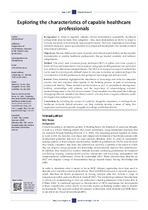| dc.contributor.author | Rowe, Michael | |
| dc.date.accessioned | 2015-07-29T10:11:56Z | |
| dc.date.available | 2015-07-29T10:11:56Z | |
| dc.date.issued | 2015 | |
| dc.identifier.citation | Rowe, M. (2015). Exploring the characteristics of capable healthcare professionals. South African Journal of Physiotherapy, 71(1):1-6 | en_US |
| dc.identifier.issn | 0379-6175 | |
| dc.identifier.uri | http://hdl.handle.net/10566/1551 | |
| dc.description.abstract | BACKGROUND: In order to negotiate complex clinical environments successfully, healthcare professionals must be more than competent – they must demonstrate an ability to adapt to dynamic situations and continually improve performance. However, emphasis on knowledge and skills alone may ignore opportunities for professional development that enables students to become practitioners.OBJECTIVES: The aim of this study was to ascertain what clinical experts believe are the essential characteristics of capable healthcare professionals that go beyond academic and technical competencies. competent practice, but also explored other aspects of the learning process as part of developing professional identity. These included self-evaluation as part of professional development, building relationships with patients, and the importance of acknowledging students’ emotional responses to the clinical environment. Panel members also discussed the challenge of inappropriate role-models in the clinical context, who may have a negative influence on the development of professional practice. METHOD: This study used a nominal group technique (NGT) to gather data from a panel of South African and international clinical experts, using open-ended questions and qualitative data analysis to determine emergent themes. The NGT is an interpretive research method that can be used to explore poorly defined topics, in this case to develop an understanding of the characteristics of health professionals that go beyond knowledge and technical skill. RESULTS: Panel members highlighted the importance of knowledge and skills for CONCLUSION: By including the concept of capability alongside competency in undergraduate healthcare curricula clinical educators can help students develop a sense of being that emphasises professional growth alongside knowledge and technical skills. | en_US |
| dc.description.sponsorship | The project was partially funded by the National Research Research Foundation. | en_US |
| dc.language.iso | en | en_US |
| dc.publisher | South African Society of Physiotherapy | en_US |
| dc.rights | Authors may deposit their own versions of the final text following peer review, with a link to the published version. | |
| dc.source.uri | http://dx.doi.org/10.4102/sajp.v71i1.247 | |
| dc.subject | Healthcare professionals | en_US |
| dc.subject | Clinical experts | en_US |
| dc.subject | Academic competencies | en_US |
| dc.subject | Technical competencies | en_US |
| dc.title | Exploring the characteristics of capable healthcare professionals | en_US |
| dc.type | Article | en_US |
| dc.privacy.showsubmitter | false | |
| dc.status.ispeerreviewed | true | |
| dc.description.accreditation | Department of HE and Training approved list | en_US |

